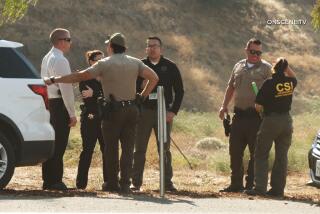Escondido Man Will Stand Trial in Slaying of Female Hitchhiker : Investigation: Charge comes from task force probing deaths of 45 prostitutes and transients. The defendant will also be charged with attempted murder, rape.
- Share via
Ronald Elliot Porter, a former Escondido auto mechanic charged with two murders by an investigative task force probing a series of 45 prostitute and transient killings, has been ordered to stand trial in one killing. A second murder charge was dismissed.
Porter, 45, was charged with the murders last September while in state prison for violating parole after serving four years for an attack on a 30-year-old prostitute.
San Diego Municipal Judge Joan Weber ordered Porter on Tuesday to stand trial for the 1988 killing of Sandra Cwik, 43, a transient from Florida who had been hitchhiking in El Cajon shortly before she was found dead on Sheepshead Mountain Road north of Buckman Springs.
Cwik died from a loss of blood as she walked barefoot down a rugged road searching for help, authorities said.
After a four-day preliminary hearing, Porter was also ordered to stand trial on five counts of attempted murder and two counts of rape with a foreign object involving five other victims from 1986 to 1988.
But Weber ruled there was insufficient evidence to charge him with the murder of Carol Gushrowski, 26, an El Cajon mother of two who disappeared in June of 1986 and whose body was found one month later. Her husband reported that she had been on medication and suffering from depression at the time she disappeared.
Gushrowski’s body was found near Old Highway 80 in the Buckman Springs area.
On Tuesday, Weber also dismissed one of the rape counts, citing insufficient evidence.
Prosecutor Jeff Dusek of the Metropolitan Homicide Task Force, which has been probing a series of 45 prostitute and transient murders since 1988, said he was not surprised by the judge’s ruling.
“We knew that (Gushrowski) wasn’t our strongest case,” he said. “The only evidence we had was the modus operandi and the location of the body. We can’t quarrel with her decision.”
Nevertheless, Dusek said he might refile the Gushrowski murder charge in Superior Court.
Porter’s attorney, Terry Kolkey, said he was gratified by the judge’s decision regarding Gushrowski.
“I was pleased that Mr. Porter was not held to answer to one of the murder charges,” Kolkey said. “I think it was a correct decision. It will make a substantial difference in our strategy for trial.”
If Dusek refiles the murder charge, Kolkey said, he will object, which will result in “a large quantity of paperwork.”
Porter’s arraignment on all eight counts of murder, attempted murder and rape is set for March 18.
The task force has been looking at Porter since he was sentenced in 1989 to four years in state prison for an attack on Annette Russell, 30. A prostitute who worked El Cajon Boulevard like many of those whose bodies were later found, Russell was picked up and taken to an area near Buckman Springs, where she was choked unconscious and left by the side of the road.
Sheriff’s deputies found her still alive, and she described the car her assailant was driving. Porter was stopped and arrested a short time later.
Charged with six felony counts--including assault, battery and oral copulation of an unconscious person--Porter pleaded guilty a week before his trial to two counts: assault and sexual battery. The other charges were dropped.
He served 20 months of a four-year prison term beginning in April, 1989. While in prison, task force investigators questioned him about several killings.
Although released from prison, task force detectives kept Porter under 24-hour surveillance at his Escondido apartment, which he shared with a girlfriend. In a brief interview with The Times last year, he denied wrongdoing and said he was being harassed for no reason.
Kolkey said four to seven law enforcement officials were following Porter at one point.
A little more than a year ago, Porter tried to shake the surveillance team by driving against traffic. He was charged with reckless driving and sent back to prison. The day before he was to be released, the new charges were added.
All of the evidence against Porter is circumstantial, Kolkey said, although prosecutors say they have a DNA match to link Porter to one of the attempted murders. In all the other counts, he said, the evidence allegedly tying Porter to the crimes, including the murder, involve shoe prints and the location of the bodies in the same general area.
In one of the other attempted murders, prosecutors say, they have a fiber alleged to be from Porter’s car and, in another of the murder attempts, a piece of hair believed to be Porter’s.
More to Read
Sign up for Essential California
The most important California stories and recommendations in your inbox every morning.
You may occasionally receive promotional content from the Los Angeles Times.










